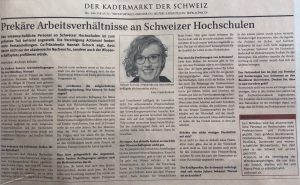Actionuni’s newly-elected co-president Hannah Schoch in conversation with Kadermarkt as to how fighting precariousness and insecurity for mid-level academic staff is a win-win for all.

Actionuni’s newly-elected co-president Hannah Schoch in conversation with Kadermarkt as to how fighting precariousness and insecurity for mid-level academic staff is a win-win for all.

Prolongations are necessary for all who have been unable to study and work as expected. Anything short of this is clearly unfair.
actionuni has teamed up with VSS-UNES and the labour union VPOD-SSP for a joint press release on the topic of extensions and prolongations for students and mid-level staff.
Please follow the link to the press release and keep an eye on our Twitter page!
Our member from the University of Basel, avuba, has just published a comprehensive survey of UniBasel postdocs, carried out in 2020, a year we are unlikely to forget.
The data is impressive and shows how much change is needed for mid-level staff, and specifically postdoc, employment, support and promotion.
An overview of the datasets in German or in English and the survey itself and a summary of results in German and English are now publicly available. Talk of food for thought…..
The SNSF has adopted the DORA recommendations in its career funding schemes and adapted some other criteria. Follow this link to see how the SNSF intends to evaluate academic performance in a more equilibrated manner.
Our partners at Eurodoc contributed to the latest and official publication from Science Europe on Recommendations on Research Assessment processes.
This is guaranteed to be a fascinating read! Hover over the text for all links.
Please follow this link to read this sobering research article from Australia where the authors “….found that 75% of students expect to experience financial hardship as a result of the pandemic. Consequently , 45% report being pushed beyond their financial capacities and expect to be forced to disengage from their research within six months. Comparative pre-COVID data from an Australian national survey, reports research student disengagement of 20% over four years. The 25% increase of expected disengagement, in a much-reduced period, signals a deeper PhD crisis. Swift intervention is required to avert substantial impacts to the pipeline of research talent.”
The limitation initiative, including the termination initiative, affects the universities to a high degree: it jeopardizes two bilateral agreements that are important for the Swiss universities: The free movement of persons and the European research framework programmes.
We would like to draw your attention to the following media release from swissuniversities:
swissuniversities has adopted a new transformative pilot agreement with Elsevier for research access and Open Access publishing in Switzerland.
Please see the details of this operation here!
Our member ACIDUL at UniLausanne has responded to all the red-tape for prolongation requests and is clearly dissatisfied with the application process.
Please follow this link for detailed information on ACIDUL’s requests for a simplification of these procedures in support of all mid-level staff at UniLausanne.
The latest information bulletin INFO-18 from our partners at swissfaculty is now online. It features an article written by former actionuni co-president Salome Adam on why we need structural improvements for mid-level staff employed at Swiss universities.